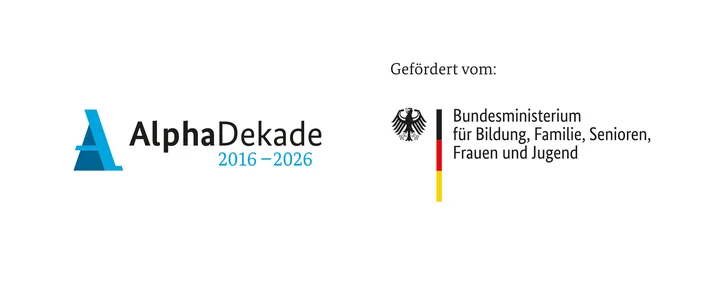Basic education pathways
Why are basic education pathways important?
In Germany, 6.2 million people are unable to read or write, or can only do so to a limited extent. However, less than 1 percent of them participate in educational programmes. This statistic was revealed by the 'LEO Study 2018', which analysed the reading and writing skills of German-speaking adults aged 18–64 and categorised them by 'alpha levels'.
A more recent study, PIAAC 2023, examined the basic skills of adults in Germany aged 16–65 within an international context. The study found that one in five German adults possesses only basic abilities in reading, everyday mathematics and adaptive problem-solving skills.
Both studies provide valuable insights into the state of literacy and basic education in Germany. The question now is how to reach and motivate adults with basic education needs in the long term. This is a key concern for AlphaDekade, as many participants in learning programmes drop out due to a lack of access to follow-up offers, advice, and support, leaving them in a difficult position.
Our aim is to close these gaps by developing long-term solutions that help people with low literacy levels to build their skills. We strive to create learning pathways that are rooted in everyday life and tailored to the needs of adults needing basic education. These pathways are designed to support them in both their professional and family lives. Through targeted measures in continuing vocational training and qualification, we aim to open doors for these individuals in the labour market.
With this goal in mind, we will support and accompany ten regional projects in developing and trialing basic education pathways through to 2028. We will build on existing resources and establish and expand regional networks. For these pathways to succeed, coordinated structures and institutions are essential to align services and shape educational pathways.
We also aim to make our findings accessible to the wider public, so that basic education programmes can be established in other regions and benefit even more people. At the same time, we aim to make existing services, support programmes and tools more transparent and easier to access.
Who do we want to reach with the basic education pathways?
Adults with low literacy levels form a highly diverse group in terms of learning requirements, life situations, and general circumstances. To develop suitable solutions that match these varied realities, the projects addressed two key questions: Which groups are present in each region? What learning and counselling services can they already access? Where are the gaps – and where do people tend to dropout?
The result is a set of basic education pathway concepts tailored to specific groups. These include long-term job seekers; trainees and employees at risk of dropping out or losing their jobs; young adults without a school-leaving qualification; and those in transition to the world of work, including immigrants. Some pathways are designed specifically for participants in integration courses – for example, “GrundBildungsBrücken Hamburg”, “Mind the GAP” and “GrubiTZ”.
Most of the pathways are designed to improve access to the labour market or vocational qualification opportunities. Examples include “InfraGru Trier”, “BerKo” and “NetzWege”. Other projects – such as “Zukunftswege”, “GrubiKomNRW” and “AoG-plus-TQ" – focus on developing pathways that allow people to earn partial qualifications. The “GriPs” Project meanwhile prepares participants for work in the care sector.
Higher, broader, more inclusive.
Society is in a state of constant change. Technological, demographic and ecological shifts are happening faster than ever, resulting in new and evolving job roles. As a result, employees need to keep adapting. This means learning how to use digital tools confidently and developing future skills such as self-management, adaptability, empathy, critical thinking, and the ability to act independently.
But what does this mean for people with low literacy levels?
For people with low literacy levels, keeping up with these changes can be especially challenging. Gaining qualifications or progressing in a job becomes harder when technical terms, complex written work instructions, math-related tasks, or new technologies create barriers.
Given that 47.4% of adults with low literacy skills in Germany speak a language other than German as their first language, it is important that basic education programmes place greater focus on the needs of immigrant adults.
To address this, the projects align with at least one of the ‘higher, broader, more inclusive’ guidelines when defining target groups. These guidelines should help ensure that services, counselling and funding are better tailored to these changes.
What makes up a basic education pathway?
Basic education pathways bring together a range of complementary elements. These may include counselling sessions at a Volkshochschule (adult education centre), earning language certificate, taking job-related language courses, building basic skills, or participating in pre-vocational measures. A wide range of organisations and partners are involved in these steps. These include educational and employment providers, companies, and municipal and social institutions such as job centres, employment agencies, adult education centres, and chambers of commerce.
Providing the right learning and counselling opportunities at each stage is crucial to the success of these pathways. Just as important is helping individuals understand their current skill levels, so they can build on what they already know and continue developing.


Status 25/05/2021. https://www.alphadekade.de/SharedDocs/Downloads/DE/weitere_dokumente/arbeitsprogramm_alphadekade.html?templateQueryString=arbeitsprogramm
[2] ↑Funding code 2103A+B+CGBP

